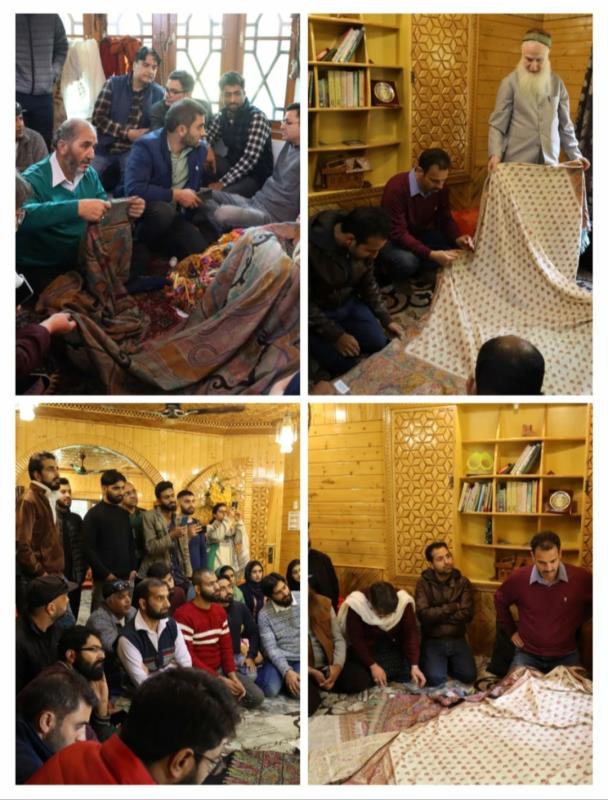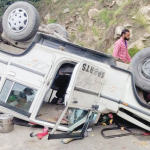Seher Mir, a 17-year-old Class 12 girl from Pampore in Pulwama, creates awareness about two taboo subjects, mental health and menstruation. As a part of her campaign, she carries out awareness drives in governemnt schools and among women in rural areas.
As a part of her campaign, she carries out awareness drives in governemnt schools and among women in rural areas. Andleb-i-Firdous, also known as ‘ZOON’ is a non-profit youth organization, whose seeds were sown by Seher Mir in October 2021.
The organization works at creating awareness about menstruation and mental health by important uplifting landmarks and their people.
The organisation’s main aim is to teach the values of women’s health, menstrual hygiene management and sanitation among rural girls and women.
Her resolve had a domino effect and what started out as the brainchild of a single individual grew into a team of 50 like-minded teenagers.
While talking to ANI, Sehar Mir said “When we talk about Kashmir, women have been most targeted and isolated when they accept the menstrual cycle as a natural phenomenon and openly talk about it. In rural areas, women lack safe spaces where they can openly talk about periods and related issues. They are unaware of safe menstrual hygiene practices and sustainable menstruation solutions.”
“Majority of rural women of Kashmir still use filthy cloth pieces as absorbent during periods because of many reasons. One of the main reasons behind not using any sanitary products during periods is shyness. They feel ashamed of buying sanitary napkins. We started from the birthplace of an important Kashmiri personality Habba Khatun. At her birthplace, Chandhara, we lead many menstrual health drives to provide accessible menstrual products while educating young girls on menstrual health and hygiene,” she said.
She said that they are doing awareness campaigns not just on menstruation and mental health, but also on climate change and economic stability.
“We are also doing awareness in government schools. Our focus is to shift to private schools as well now. She said. I started with my own pocket money but eventually, I started a fundraiser and collected around 50k. Then apart from this, I have some people who voluntarily donate money to the organization,” she said.
“Over time, Andleb-i-Firdous, commonly referred to as ZOON, has broadened its objectives and presently addresses not only mental health and menstruation but also issues like climate change and economic stability in its awareness drives. The drives are characterized by the distribution of sanitary pads at the end,” she further said.
Additionally, ZOON addresses a range of mental disorders, menstruation and hygiene and sexual abuse through its Instagram handle @andleb_i_firdous, Sehar said.
According to Sehar Mir, since the “zoon” establishment, 50 unpaid volunteers at the NGO have managed to conduct awareness drives in remote areas such as Pattan Baramulla, Mirgund Baramulla, Chandhara Pampore, Shar Shali Pampore, Laltrag Pampore, and Zantrag Pulwama, and many other backward villages of Kashmir passing their share of knowledge to over 600 students and distributing more than 10,000 free sanitary napkins amongst them.
She said that they have received appreciation from the authorities for their work and are speedily gaining recognition through their Instagram handle.
“In Kashmir, there are very few organizations which are led by students. It’s mainly because of the societal pressure of not going in these directions and just focusing on studies. I was a person who always wanted to make people aware about the stereotypes which exist in our society and to actually help the people,” she said.
“By creating this organization, I was able to reach out to people and eventually started to do what I was aspiring for a very long time. The best part about it was the response I was getting from the students which made our team even more motivated,” she added.
She further explained the stigmatic situation in the country regarding menstrual issues.
“According to a study, 88% of menstruating women in India use homemade alternatives like old fabric, whereas 63 million adolescent girls live without toilet facilities. Ignorance, poverty and neglect are the main reasons for inadequate menstrual hygiene,” she said.
“Even in modern times, conversations about topics such as mental and menstrual health are often avoided. More so in rural areas where even the early waves of modernization are yet to reach, this has given rise to disastrous, albeit expected, consequences. The unaware masses have strongly stigmatised issues that need to be addressed on a priority basis,” she said.
“I have some classmates of core members of my zoon namely Nuha Masood (DPS) a 12th class student, Ahmad Wani (DPS) 12th class student and Fayiez Rafiq (Burnhall) 12th class student. In such a scenario, generating awareness becomes the prime first step for countering the stigmatization,” she added further. (ANI)








